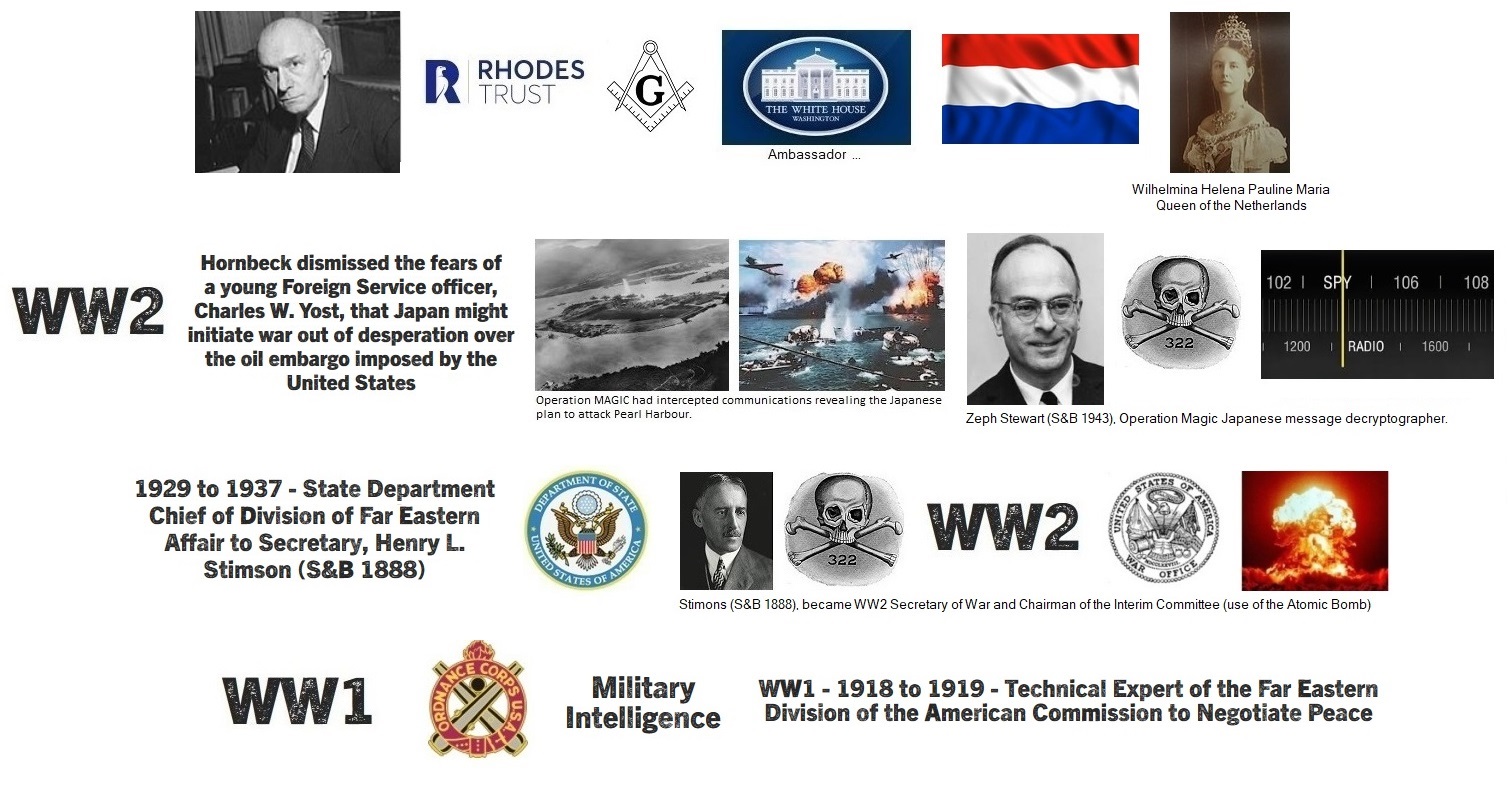
Stanley Kuhl Hornbeck (Rhodes 1904. Freemason)
Diplomat. Gov. Official. Educator. Rhodes Scholar, University of Oxford. Council on Foreign Relations.
Member of the Institue of Politics.[4]
Taught at Harvard University.[4]
1954 - Awarded a Guggenheim Fellowship for his contributions to Far East studies and political science.
2 Sep 1948, letter to Alger Hiss … Dear Alger: In pursuance of what I volunteered to you when we talked last week, I want you to know that, having known you well for ten years and having had very close association with you in the Department of State during the years from 1939 to 1944–when you were my assistants and one of my “sparring partners”–I should be glad to testify in an forum that I have never known or though of your having been engaged in any doubtful or questionable activities , or of your having given indication of radical leanings or sympathies.[5]
4 May 1945, the German occupation in the Low Countries was officially eneded, and for the next several months, dr Hornbeck flew back and forth from London supervising arrangements to resume diplomatic and consular activities in The Hague.[4]
1944 to 1947 - U.S. Ambassador to the Netherlands to Secretary of State, Cordell Hull (Father and Brother Freemasons) by President Franklin D. Roosevelt (Freemason) and Harry S. Truman (Freemason).
Preceded Anthony Joseph Drexel Biddle Jr (Biddle family). Succeeded by Herman B. Baruch (brother of Bernard)
In November 1941, contemptuous of the Japanese capacity to challenge US strength, Hornbeck dismissed the fears of a young Foreign Service officer, Charles W. Yost, that Japan might initiate war out of desperation over the oil embargo imposed by the United States. Then, ten days before the attack on Pearl Harbor, after drafting with Secretary of State Cordell Hull a hardline memo laying down conditions for relaxation of the sanctions, Hornbeck wagered that Japan would relent and that war was not imminent. The note that Hull sent the Japanese on November 26, 1941, said that Japan would have to withdraw from Southeast Asia and China before the United States would resume the oil shipments. Confident that his tough approach would cause Japan to back down, Hornbeck wrote in a memorandum the following day:[7]
In the opinion of the undersigned [Hornbeck], the Japanese Government does not desire or intend or expect to have forth with armed conflict with the United States. The Japanese Government, while launching new offensive operations at some point or piints in the Far East, will endeavor to avoid attacking or being attacked by the United States. It therefore will not order or encourage action by its agents (foremost among which are its armed forces) which, if taken, would lead toward use by the United States of armed force by way of reliation or resistance. So far as relations directly between the United States and Japan are concerned there is less reason today thatn there was a week ago for the United States to be apprehensive lest Japan make "war" on this country. Were it a matter of placing bets, the undersigned would give odds of five to one that the Japan and the United States will not be at "war" on or before December 15 (the date by which General Gerow has affirmed that he would be "in the clear" so far as consummation of certain disposals of our forces is concerned); would wager three to one that the United States and Japan will not be at "war" on or before the 15th January (i.e. 7 weeks from now); would wager even money that the United States and Japan will not be at "war" on or before March 1 (a date more than 90 days from now, and after the period during which it has been estimated by our strategists that it would be to our advantage for us to have "time" for further preparation and disposals) ... Stated briefly, the undersigned does not believe that this country is now on the immediate verge of "war" in the Pacific.[3]
1938 - Married Vivienne Barkalow Hornbeck.
1929 to 1937 - State Department Chief of Division of Far Eastern Affair to Secretary, Henry L. Stimson (S&B 1888) by President Herbert Hoover (CFR)
1918 to 1919 - Technical Expert of the Far Eastern Division of the American Commission to Negotiate Peace by President Woodrow Wilson (Edward M. House)[4]
1916, Published China and Japan, Contemporary Politics in the Far Easy.
WW1 - U.S. Army Ordance and Military Intelligence. Later, he would become a colonel.[4]
1911 - University of Wisconsin (Doctor of Philosophy)
1909 to 1913 - Taught in various institutions in China, beginning at Hangchow University.[4]
1907 to 1909 - Teaching fellow and doctoral candidate at Wisconsin University.[4]
From 1904 to ? - Rhodes Scholar, Christ Church College, University of Oxford.[1]
Died Dec 1966, from Not Known. Age 83.
[3] - Pearl Harbor: Warning and Decision By Roberta Wohlstetter
[7] - Japan Rising: The Resurgence of Japanese Power and Purpose By Kenneth Pyle



Comments